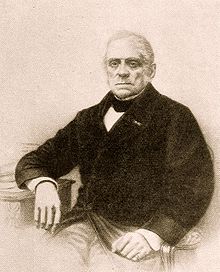Daniel François Esprit Auber
| Daniel Auber | |
|---|---|
 |
|
| Born |
Daniel François Esprit Auber 29 January 1782 Caen, France |
| Died | 12 May 1871 (aged 89) Paris, France |
| Occupation | Composer |
Daniel François Esprit Auber (French: [danjɛl fʁɑ̃swa ɛspʁi obɛːʁ]; 29 January 1782 – 12/13 May 1871) was a French composer.
The son of a Paris print-seller, Auber was born in Caen in Normandy. Though his father expected him to continue in the print-selling business, he also allowed his son to learn how to play several musical instruments. His first teacher was the Tirolean composer, Josef Alois Ladurner. At the age of 20 Auber was sent to London for business training, but he was obliged to leave England in 1804 when the Treaty of Amiens was breached.
Auber had already attempted musical composition, and at this period produced several concertos pour basse, modelled after the violoncellist Lamare, in whose name they were published. The praise given to his concerto for the violin, which was played at the Paris Conservatoire by Mazas, encouraged him to undertake a resetting of an old comic opera, Julie (1811). He also began to study with the renowned Luigi Cherubini.
In 1813 the unfavourable reception of his one-act debut opera Le Séjour militaire put an end for some years to his attempts as composer. But his failure in business, and the death of his father in 1819, compelled him once more to turn to music. He produced another opera, Le Testament et les billets-doux (1819), which was no better received than the former. But he persevered, and the next year was rewarded by the complete success of La Bergère châtelaine, an opera in three acts.
This was the first in a long series of brilliant successes. In 1822 began his long association with librettist Eugène Scribe. Their first opera, Leicester, shows evidence of the influence of Gioachino Rossini in its musical style. Auber soon developed his own voice, however: light, vivacious, graceful, and melodious—characteristically French.Le maçon (1825) was his first major triumph, staying in the repertory until the 20th century, with 525 performances at the Opéra-Comique alone. An ensemble from the latter found its way into Herold's ballet La Somnambule (source of Bellini's La sonnambula) as an air parlante (a way of explicating the plot through the words of a relevant operatic aria or salon piece).
...
Wikipedia
